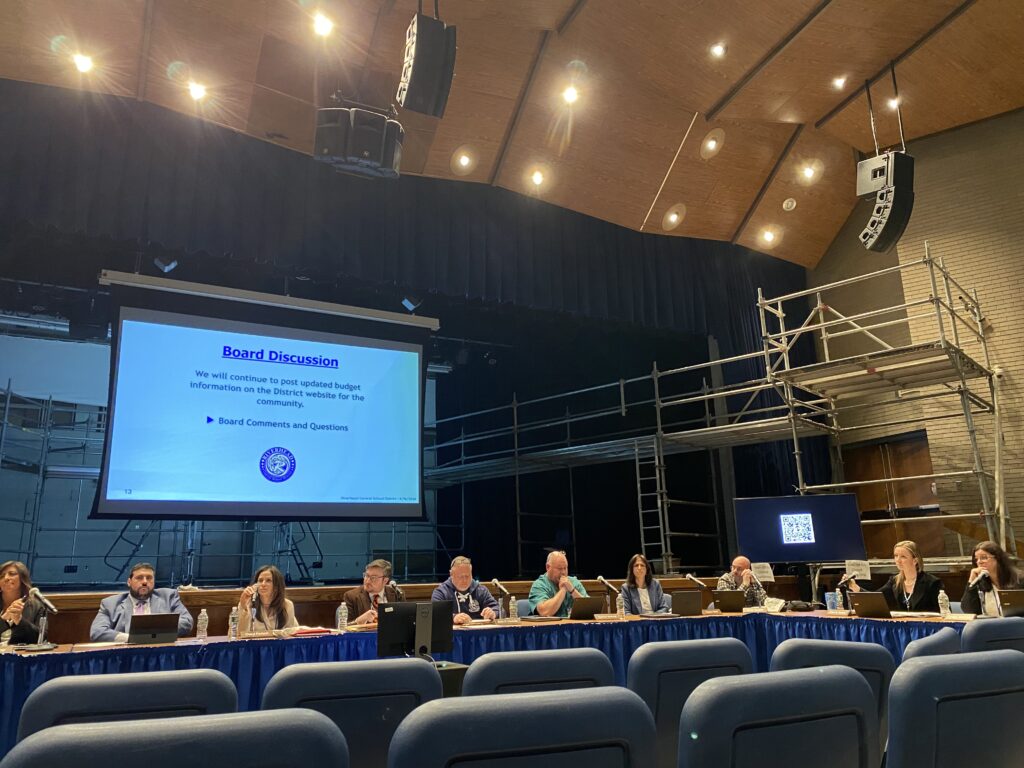Riverhead highway super gets push back from board on budget questions, concerns
Riverhead Highway Superintendent George “Gio” Woodson had an unsuccessful day before the Town Board at last Thursday’s work session.
First, officials said his budget surplus was too high, then they gave him only half the surplus money he requested to cover possible emergency expenses between now and Dec. 31, then they refused to give him a breakdown of what the $768,900 his department must pay in “charge-backs” to the town’s general fund is used for.
At the end of 2010, the highway department had a fund balance, or money unspent, totaling $2,876,910, according to town finance administrator Bill Rothaar. That equals 43 percent of the department’s proposed 2012 budget of $6,733,200.
“That’s way too high,” Supervisor Sean Walter said at the session.
The fund balance was used this year to pay for new salt barns required by the state and for a drainage project on Oakleigh Avenue in Calverton, which will bring the total down to $2,105,410 by the end of this year, according to Mr. Rothaar.
Mr. Woodson said the fund balance is a result of careful spending.
But Town Board members said they’d like to see him spend more of it.
While Mr. Woodson is an elected official, the Town Board still controls his budget. Thus, he needs the board’s approval to transfer funds or use surplus money.
“I think 18 percent seems a little low,” Mr. Walter said, referring to the percentage of the highway department’s budget that he feels a fund balance should comprise. “I’m comfortable in the 22 percent range.”
Unlike school districts, state laws do not restrict how much surplus funding a town can keep, Mr. Rothaar said, although the town will be required by new federal standards to adopt a new fund balance policy soon.
On Thursday, Mr. Woodson was seeking to apply $200,000 of his surplus funds to cover his department through the end of the year. He said he needs to have money available in the event of an emergency, and he also needs money to pay for equipment and gas, since he has overspent those lines in his budget.
“If we have another emergency, we’re screwed,” Mr. Woodson said. “Where are we getting the money from?”
But Town Board members decided to let him use only $100,000, and to reserve a decision on the rest for a future meeting.
“If you don’t need it, I’d rather it be in reserve,” Mr. Walter said.
Councilman Jim Wooten said he agreed that there should be a contingency fund in case of a hurricane or unexpected occurrence.
“If we keep slicing his budget and he has to come back during the course of the year, that’s not good,” Councilman John Dunleavy said.
Mr. Woodson said he needs money to purchase parts for his equipment, since that line in his budget has been fully spent. Mr. Rothaar said Mr. Woodson has overspent the department’s equipment budget by $200,000 and his gasoline budget by $54,000. Mr. Woodson said he cannot get purchase orders approved by the town unless there is money in those lines in the budget.
Mr. Woodson also asked how the town decided that the highway department had to pay $768,900 in charge-backs to the general fund in the town’s preliminary 2012 budget.
The town has traditionally required the highway department and other departments to pay charge-backs to the general fund, but that amount has increased in recent years, from $540,300 in highway charge-backs in 2008 to $738,800 in 2010.
Mr. Woodson asked for an itemized listing of what this money is being used for.
But Mr. Rothaar said that wouldn’t be feasible.
“It would require employees to write down what they did every 15 minutes.” Mr. Rothaar said.
He said the town instead uses a percentage across the board. Currently, that percentage is 14 percent of the previous year’s actual budget.
Other departments that must pay charge-backs to the general fund include the water district, the sewer district, the parking district, the business improvement district, the ambulance district, the Calverton sewer district, and the scavenger waste district.
Mr. Rothaar said these districts benefit from general fund services such as administrative or clerical services.








